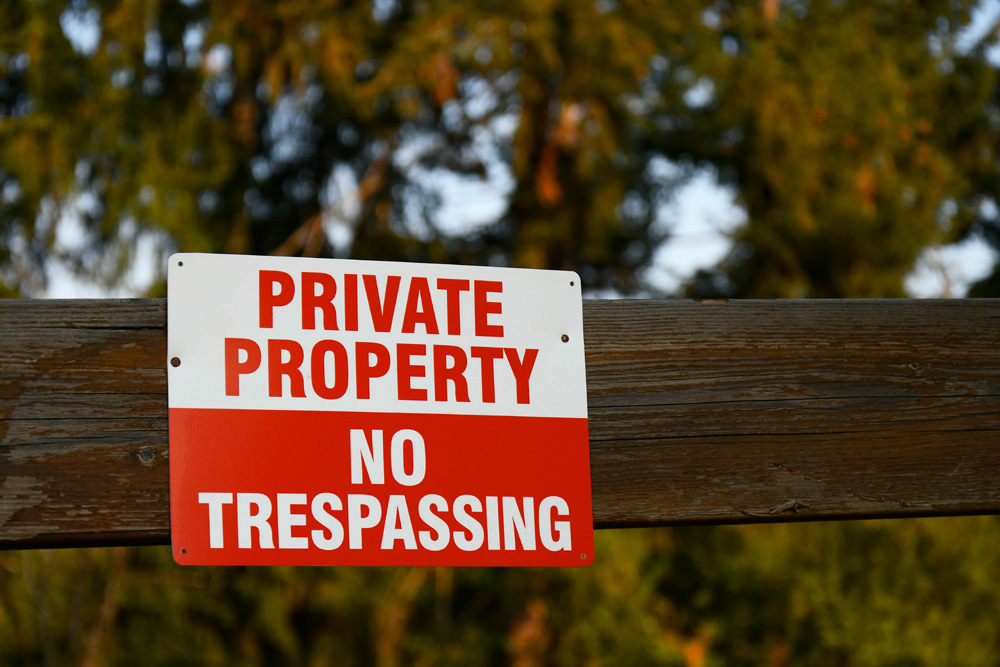
What Are the Different Types of Criminal Trespassing in Florida?
It’s common to see “no trespassing” signs on buildings or poles on privately owned land, warning you to stay off the premises. But what exactly constitutes criminal trespassing? What are the potential legal penalties if you ignore these signs?
Trespassing is entering another person’s property without their permission. According to Florida Statute Title XLVI Chapter 810, you can be charged with a misdemeanor if you enter or remain on a property after receiving a warning or notice of trespass from the property owner or an authorized individual. Knowing the types of trespassing charges can help you avoid unlawful situations and stay compliant with state regulations. Fighter Law and our board-certified lawyers are here to protect your rights.
Details of Criminal Trespassing Under Florida Law
Florida’s trespassing laws specify different types of locations where trespassing can occur. Each type has its own set of definitions and rules:
- Structured building: This term refers to any building with a roof, regardless of its use.
- Posted land: Land with “no trespassing” signs posted at intervals of no more than 500 feet, with each sign at least two inches high.
- Fenced land: This includes any land enclosed by a fence or other barriers such as walls, logs, or posts.
Most trespassing offenses in Florida are considered misdemeanors. However, violating a trespass warning or carrying a weapon may elevate the charge. Below are the various criminal trespassing charges that an individual may be charged with in Florida.
Trespassing in a Structure or Conveyance
Trespassing in a structure or conveyance, such as a building or vehicle, is a serious offense. This type of trespass is often more severe due to the potential for harm or damage to property. Florida law classifies this offense as a misdemeanor with penalties that include up to 60 days in jail, but it can escalate to a felony under specific conditions.
Trespassing on Property Other Than a Structure or Conveyance
One common type of trespassing involves entering or remaining on land that is not a building or vehicle. That may include open fields, fenced areas, or private lots. Trespassing on such property is typically a first-degree misdemeanor, leading to a one-year jail sentence, one year of probation, and $1,000 in fines. Repeated violations can result in harsher penalties, including longer jail sentences and higher fines.
Armed Trespassing
Armed trespassing is one of Florida’s most severe forms of criminal trespassing. This offense involves entering someone else’s property while carrying a firearm or other dangerous weapon. Having a weapon greatly heightens the potential danger to property owners and occupants.
As a result, armed trespassing is classified as a third-degree felony in Florida. Those convicted of armed trespassing may face harsh penalties, including up to five years in prison and substantial fines.
Trespassing on School Property
Trespassing on school property is a specific offense that involves entering or remaining on the grounds of a school without authorization. This type of trespassing is taken very seriously due to the potential risk to students and staff.
Penalties for trespassing on school property can range from first to second-degree misdemeanors, depending on the circumstances. Factors such as prior offenses, carrying weapons, or causing disturbances can lead to more severe felony charges and fines of up to $5,000.
Talk to Seasoned Trespassing Defense Attorneys in Orlando, FL
If you are facing criminal trespassing charges, know that there are potential defenses that may apply to your case. At Fighter Law, one of our seasoned trespassing attorneys can assess your case and devise the most effective defense strategy.
Criminal trespassing charges in Florida can be startling, but you don’t have to deal with them alone. Led by trial attorney and military veteran Thomas Fighter, our criminal defense team in Orlando offers aggressive and experienced representation. We recognize how these charges can affect your life and fight for the most favorable results while providing the support you need throughout the legal process. Schedule your free consultation with Fighter Law today by calling (407) 344-4837 or completing our contact form.
Share:
free case evaluation
Fill out the form below for an free evaluation of your case.
Categories
- Birth Injury
- Boating Accidents
- Car Accidents
- Civil Rights
- Criminal Defense
- Cyberstalking
- Divorce
- Dog Bite Injury
- Domestic Abuse Charges
- Domestic Violence
- Drug Charges
- DUI Charges
- Family Law
- Felonies
- Fighter Law Firm
- Firearms
- Firm News
- Guardianship
- Injunction Removal
- Injunctions
- Marketing
- Personal Injury
- Repeat Violence Injunction
- Restraining Order
- Seal and Expunge
- Sex Crimes
- Slip and Fall
- Stalking Injunction
- Theft and Robbery
- Theme Park Trespasses
- Traffic tickets
- Uncategorized

